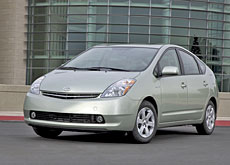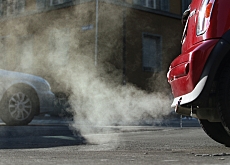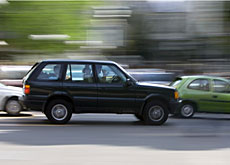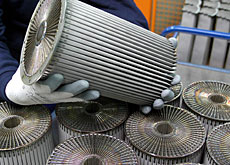Government cranks up pressure on car emissions

The Swiss government has drawn up a list of around 6,000 vehicles, ranking them on the damage they cause to the environment.
The decision to name and shame the heaviest polluters is the latest in a series of efforts aimed at reviving lagging efforts to cut CO2 emissions in Switzerland.
The list forms part of plans to replace the existing fuel-efficiency “energy label” on new cars with a more comprehensive “environment label” that would also reflect emissions, noise pollution, fuel-type and climate impact.
The criteria, which have yet to be finalised, would not take account of the size or weight of a vehicle.
The Federal Environment Office, which expects the new label to come into force in 2010, said it could pave the way for a new way of taxing cars that would penalise the big polluters and reward more eco-friendly models.
“It would enable environmental aspects other than fuel efficiency to be taken into account when it comes to fixing cantonal taxes on motor vehicles or federal import taxes,” the environment office said in a statement.
Fuel consumption
Five years ago the government struck a deal with the Association of Swiss Automobile Importers aimed at reducing the average fuel consumption of new cars in Switzerland from 8.4 to 6.4 litres per 100 kilometres by 2008.
As a result, new cars have had to carry an energy label since January 1, 2003, to help buyers choose more fuel-efficient models. The colourful labels, coded A to G, are similar to those already seen on electrical appliances.
But the initiative has had a limited impact. Last year fuel consumption only fell by 0.65 per cent to 7.62 l/100km.
The problem, says the environment office, is that better fuel efficiency and a bigger range of lighter, more economical cars have been offset by the trend towards heavier four-wheel drives and other gas-guzzlers.
Earlier this year Switzerland’s Young Greens announced they would collect signatures to force a nationwide vote to keep them off the roads.
Dust particles
Officials said on Sunday that the initiative fell under the action plan announced by Environment Minister Moritz Leuenberger in January last year to curb emissions of cancer-causing dust particles.
Leuenberger proposed nine new measures aimed at reducing the thousands of deaths caused annually by pollution. Three of the nine measures concern traffic, which is responsible for 28 per cent of dust particle emissions.
Responding to the latest developments, Patrick Eperon of the Swiss Touring Club told the NZZ am Sonntag that he found the proposal “interesting” but warned that Switzerland should not go it alone.
The Swiss Transport and Environment Association added that the new label was a step in the right direction, particularly as it dealt with emissions in general and was not based on car size.
But the Association of Swiss Automobile Importers said it was unimpressed by the move, adding that it could not understand why criteria such as noise were being brought into play.
“Everyone knows that the amount of noise depends above all on the road surface and tyres,” said director Andreas Burgener.
swissinfo with agencies
The government announced last month that it would introduce a tax on carbon dioxide emissions from January 1, 2008, to help it meet its Kyoto objectives.
The tax will be applied to all imported fossil fuels, amounting to around three centimes on each litre of heating oil and 2.5 centimes on a cubic metre of gas.
The CO2 tax becomes mandatory in 2008 because Switzerland failed to reach its own emissions reduction target for 2006.
It had pledged to cut last year’s emissions by at least 6% compared with 1990 levels, but only managed 4.5%.
According to the new list, the least polluting car is Toyota’s Prius, with 76 points.
This is followed Fiat’s hybrid Punto (80 points) and Panda (81), Daihatsu’s Cuore (82) and Citroen’s C3 (82)
Among the worst polluters are the Nissan Patrol (919), the Ford Transit (858) and the VW T5 (842).

In compliance with the JTI standards
More: SWI swissinfo.ch certified by the Journalism Trust Initiative



You can find an overview of ongoing debates with our journalists here. Please join us!
If you want to start a conversation about a topic raised in this article or want to report factual errors, email us at english@swissinfo.ch.